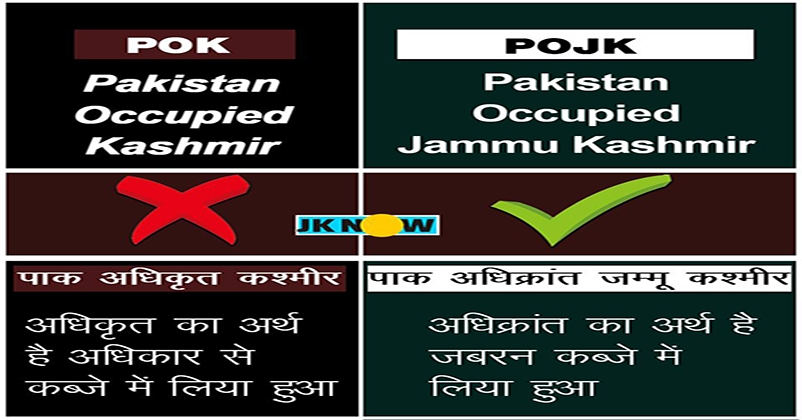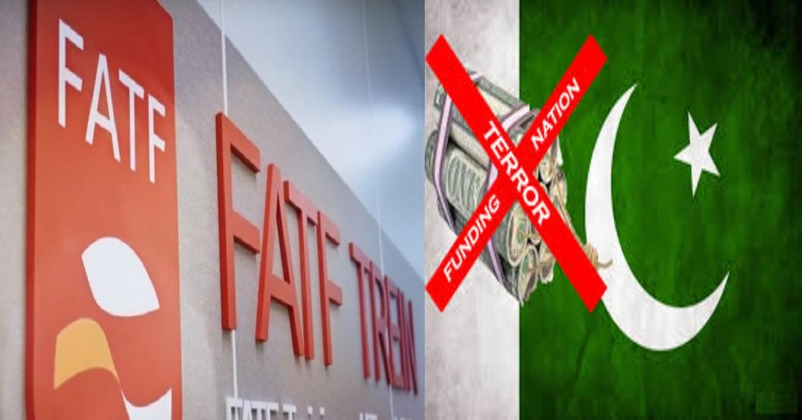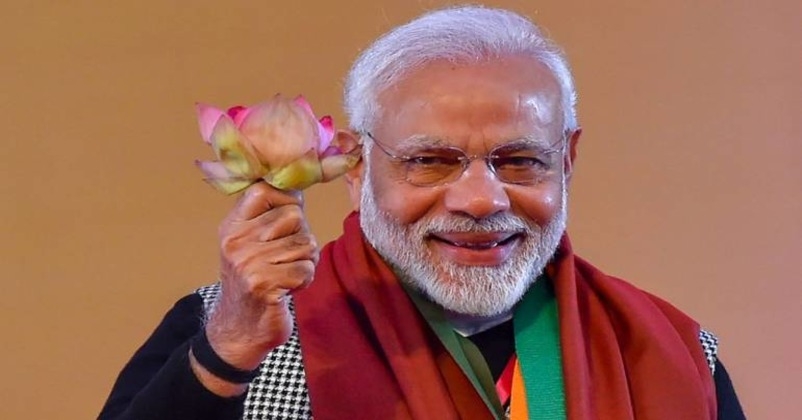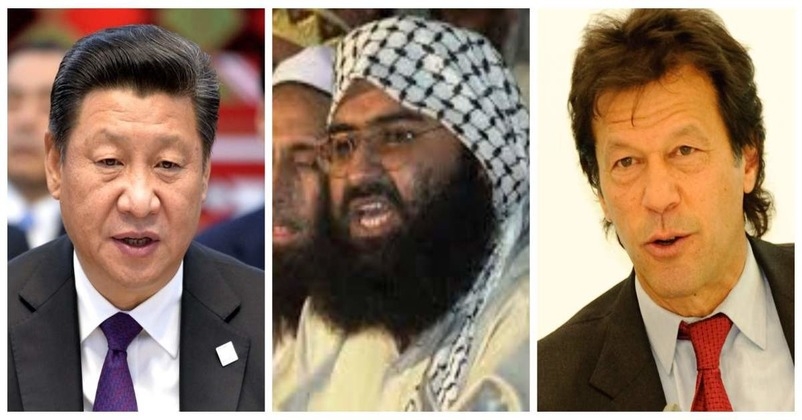India must reclaim POJK when Pakistan is at lowest ebb
| 24-Apr-2019 |

All these years, Pakistan has ranted about Kashmir. Though Pakistan was an aggressor on Jammu and Kashmir in 1947 and illegally occupied a large tract of land yet it has tried to create a false narrative around Kashmir. India has never registered a strong protest and will to claim for the land illegally occupied by Pakistan. But after Pulwama attack, India has remained offensive and getting support globally. Pakistan is at a low ebb and holding the land illegally would not be possible for it. India should have claimed the parts illegally occupied by Pakistan. Even now also India does have the opportune time to regain the lands that Pakistan is still occupying illegally. Pakistan support to terrorism and intensifying sectarianism has resulted in its isolation at the international level. Even the people living in POJK faced so much suppression from Pakistan. Pakistan dwindling economy and the emergence of India as a superpower makes it the right time to strike the chord. Therefore, India must rise to the occasion and work on reclaiming the land of Jammu and Kashmir, which are illegally occupied by Pakistan.
J&K an integral part of India
The legal authority in the matter of the state of Jammu and Kashmir was Maharaja Hari Singh, who has to decide whether J&K will go with India or Pakistan. He signed the instrument of accession in favour of India on October 26, 1947. Hence, the state of J&K became an integral part of India. But instead of concretizing the identity of Pakistan as an aggressor on Jammu and Kashmir, a new and completely different narrative was propped up out of the blue. Ironically, no substantial efforts were made to expose the lies of Pakistan and to reclaim the part of Jammu and Kashmir, illegally occupied by Pakistan, by the Indian leadership. But with the incumbent government in Delhi, the story has changed to a great extent and Pakistan Occupied Jammu and Kashmir (POJK) has now been discussed.
Revolt in POJK against Pakistan
Pakistan invaded on Jammu and Kashmir and illegally occupied a large tract of land in 1947 by killing and expelling the aboriginals of the state. In 1970 Pakistan divided the areas of Pakistan Occupied Jammu and Kashmir (POJK) into two parts viz. Azad Jammu and Kashmir (alias Mirpur and Muzzafarabad) and Gilgit-Baltistan (Northern Areas). It is essential to note here that only Pakistan calls it AJK but as such Azadi (freedom) is not there and as per international laws also there is no freedom in the region. Gilgit-Baltistan on the other was an integral part of Jammu and Kashmir but Pakistan is making an attempt to show it as a separate region from Jammu and Kashmir; hence using the nomenclature ‘Northern Areas’. These two regions are created only to misguide national and international agencies and diverting the attention from the illegality of the occupation of Pakistan. Mirpur and Muzzafarabad was a self-governing State under the control of Pakistan with a President, Prime Minister and a Legislative Assembly whereas the Northern Areas that include Gilgit and Baltistan regions have been made into an autonomous self-governing body under Pakistan control called Gilgit-Baltistan. Gilgit-Baltistan has a Governor appointed from Islamabad and a Chief Minister. Both the regions are facing enormous hardship and exploitation in the hands of Pakistan. For more than last six decades, POJK has borne the brunt of sectarian violence, no development of civic infrastructure and amenities, denial of fundamental rights and oppression by Islamabad based polity. Democratic voices are crushed ruthlessly by Pakistan and political rights are denied to the people of these two regions of Jammu and Kashmir. Regular Shia-Sunni conflicts are also reported from Gilgit-Baltistan and extreme measures are used against the Shia community. There is a sustained and systematic campaign for disturbing the demographic order of this region by encouraging large scale migration from Khyber-Pakhtunkhwa province. Even the China Pakistan Economic Corridor is used for the benefit of Pakistan and China whereas Gilgit-Baltistan is robbed of its natural endowments. Local rebellion against Pakistan’s barbarism is also suppressed in the most brutal manner. The people of POJK wanted to get freedom from Pakistan and they are looking upto India for its support.

FATF already put Pakistan in the greylist
The Paris based Financial Action Task Force (FATF) had put Pakistan on the grey list in June 2018 and it has given Pakistan a 27 point action plan. Putting Pakistan in the greylist means downgrading of the country by multilateral lenders like IMF, ADB, World Bank, European Union and reduction in risk rating by Moody's, S&P and Fitch. Though Pakistan had lobbied for the removal of the tag but FATF has not removed the tag and if Pakistan is unable to take any concrete action before the expiry of the 15 months’ time than there is all possibility that the country would be put in the blacklist by the month of October this year. If it is put on the ‘blacklist’, Pakistan’s economy, already laden with a debt crisis, would face a move that could see it face more financial strictures, rating downgrades by international banking and credit rating agencies. The FATF criticized Pakistan in particular for not demonstrating “a proper understanding” of the terror financing risks posed by “Da’esh [Islamic State], Al Qaeda, Jamaat ud Dawa, Falah-i-Insaniyat-Foundation, Lashkar-e-Taiba, Jaish-e-Mohammad, Haqqani Network HQN, and persons affiliated with the Taliban.” In a veiled warning to Pakistan immediately after Pulwama attack, FATF said. “While all these attacks kill, maim, and inspire fear, they cannot occur without money and the means to move funds between terrorist supporters,”.

Increasing popularity of Modi at international level
Many countries have bestowed accolades on Prime Minister Narender Modi because of his statesmanship and decisive action on terrorist. These accolades are bestowed even by the Muslim nations. Russia, South Korea, Saudi Arabia, Iran, Israel, and the UAE are those countries, who have honoured Prime Minister Narendra Modi with the highest state award acknowledging his contributions in India’s diplomatic successes. Even the US House Foreign Affairs Committee, Congressman Joe Wilson, introduced bill HR 2123 to declare India a NATO ally and identified India as the pillar of stability in the region. The US has supported India’s entry in the United Nations Security Council and the Nuclear Suppliers’ Group. Modi was bestowed with UN Champions of the Earth award for his contribution to climate, energy and water security by the United Nations. A large majority of the nations are now moving away from the dead-end discussion on Kashmir’s sovereignty and trying to engage New Delhi to push for better developmental and right standards. These nations are inclusive of archrival and heavyweights of Islamic nations, the Kingdom of Saudi Arabia and the Islamic Republic of Iran.

Chinese doldrums on Pakistan
The all-weather friend of Pakistan, China is also finding it difficult to support Pakistan on terrorism. China has put a technical hold on Masood Azhar in UNSC but the international community is turning the heat over to China only. For much embarrassment of China, the US circulated a draft resolution to the UN Security Council that would blacklist Azhar as a global terrorist. This US draft resolution has resulted in a sharp reaction from China. China has also been criticized for its dual standard by Mike Pompeo who said, “The world cannot afford China’s shameful hypocrisy toward Muslims. On one hand, China abuses more than a million Muslims at home, but on the other, it protects violent Islamic terrorist groups from sanctions at the UN”. US, France, UK step up fresh efforts to proscribe Masood Azhar.
Now is the apt time, when Indian leadership must take concrete actions to regain the land that Pakistan has kept in its illegal occupation since 1947.
